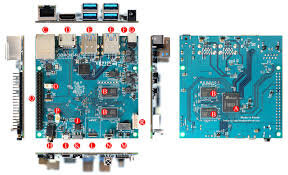The ODROID-N2 stands out as a powerful single-board computer (SBC) well-suited for AI and machine learning projects[1]. Featuring an Amlogic S922X processor with a quad-core ARM Cortex-A73 CPU cluster and a dual-core Cortex-A53 cluster, the N2 delivers impressive performance for its compact size[1]. Its Mali-G52 GPU further enhances its capabilities for graphics-intensive tasks[1].
With up to 4GB of DDR4 RAM and eMMC storage options ranging from 8GB to 128GB, the N2 provides ample memory and storage for running complex AI algorithms and handling large datasets[1]. The board’s efficient heat dissipation design, utilizing a metal housing as a heatsink, allows for sustained high performance without throttling[1].
While the ODROID-N2 offers robust hardware specifications, some users have noted limitations in software support compared to alternatives like the NVIDIA Jetson Nano[2]. The Jetson Nano, priced similarly, provides a more comprehensive software ecosystem tailored for AI and machine learning applications, including support for popular frameworks like CUDA, TensorFlow, and OpenCV[2].
Despite these software considerations, the ODROID-N2 remains a compelling option for AI and machine learning enthusiasts seeking a powerful and cost-effective SBC. Its strong CPU performance, coupled with the Mali-G52 GPU, makes it suitable for a wide range of compute-intensive tasks[1]. However, users should carefully evaluate their specific software requirements and the available support ecosystem when choosing between the N2 and other SBCs for AI projects[2].
Further Reading
1. ODROID-N2 VS NVIDIA Jetson Nano – JFrog Connect
2. Good hardware but with good software ? Need highlights from Odroid – ODROID
3. https://segnes.com/linux/linux-machine-learning/
4. Most powerful single-board computer (SBC) : r/selfhosted
5. https://aiforsocialgood.ca/blog/learn-how-to-implement-artificial-intelligence-training-for-enhanced-machine-learning


